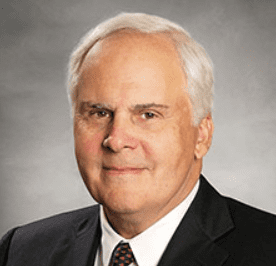This article first appeared on the Magnolia Tribune.
FedEx is humbly rooted in Marks, Mississippi, by way of company founder Frederick W. Smith. His was not an overnight success.
In today’s world, it takes just a moment to purchase something online and have it shipped to your home. Just a few clicks will have your new item sent right to your doorstep. The implementation of fast shipping made it possible for even the most remote places in Mississippi to get a shipment from merchant thousands of miles away in just a few days, or even sooner – if you’re willing to pay the shipping costs.


FedEx, one of the most recognized names in doorstep delivery, is humbly rooted in Marks, Mississippi, via the founder and executive chairman of the board of directors, Frederick W. Smith.
Smith, over time, amassed a no-small-potatoes fortune of $5.6 billion, according to Forbes Magazine. However, it wasn’t an overnight success.
Even the biggest companies in the world started with just a novel idea, one that may not have received much credit in the beginning. FedEx was the same way.
The concept for FedEx got its start merely as observations about the evolution of a more automated society in Smith’s economics term paper at Yale in 1965. Smith was seeing the writing on the wall, even then, as modern technology started to swiftly permeate all levels of industry in the United States, according to PBS. Demand for products would grow, and companies would have to sink or swim when it came to delivering those products quickly.
Smith’s paper only earned him a “C” for the grade.
Smith had to shelve any work he would have done on FedEx for a few years, though; upon graduation, Smith joined the Marines and fought in Vietnam, not to return until 1971.
An existing model for a modern revolution in transport
Smith’s predictions about the evolution of commerce were glaringly correct by the time he returned from Vietnam. The implementation of faster systems, even in the early 1970s, was being mucked down by slow and inconsistent delivery times. It was then that Smith fully developed the idea of FedEx by modeling it after a hub-and-spokes model.
The hub-and-spokes could be simply described as a network by which there is a hub, or a center, for distribution, with direct lines, or spokes, to other locations. If one were to draw a map of this, it would look similar to a wagon wheel—the hub, at the center, turning and keeping everything connected, with the spokes providing an even connection outward to keep everything moving.
Originally, it was Delta Airlines that pioneered this method with travel in the mid-1950s, but Smith saw this model and knew it could be applied to shipping in the United States.
A counterintuitive start
FedEx was launched out of Memphis in 1973, but it wasn’t an instant success. There were many upsides that should have secured a triumphant start for the new company. The central location of Memphis allowed for a “hub” with an airport that was rarely down due to bad weather. The airport was also willing to make some changes to accommodate FedEx, and there was readily available space. On April 17th, 1973, FedEx officially launched, with nearly 190 packages being delivered to 25 cities in one night. However, within two years, the company was hemorrhaging money, to the tune of $29 million.
Facing a substantial loss, Smith made a counterintuitive (read by some as dumb, honestly) to fly to Vegas and try his luck in Sin City. That decision, though the definition of risky (and, again, by some, a really dumb risk), turned out to be a springboard for success. Smith won $27,000 and invested it back into the company.
Smith told Forbes that he was fully aware of how hazardous such antics could have been.
“No business school graduate would recommend gambling as a financial strategy,” said Smith. “But sometimes it pays to be a little crazy early in your career.”
In this case, the gamble was a risk worth taking. By 1977, FedEx was buying 727s after lobbying for Congress to pull back on some air cargo regulations. By 1978, FedEx was listed on the New York Stock Exchange.
Frederick W. Smith today
Fredrick W. Smith continued to run FedEx for the next 50 years. In March of 2022, Smith stepped down from the CEO position and has since maintained his role as Executive Chairman of the Board at FedEx. At the age of 79, Smith is the 506th richest man in the world, with a net worth of $5.6 billion. That’s more than Starbucks Founder Howard Schulz, and Robert Johnson, of Johnson and Johnson and New York Jets fame, who both have a $3.2 billion net worth.
Though Forbes 400 doesn’t rank Smith highly on the list of philanthropic billionaires, it could be because Smith and his foundation don’t often advertise what they’ve given or supported. Smith has contributed to his hometown of Marks, Mississippi via The Marks Project— a $25,000 grant was given by Smith to create educational summer programs for children. The Smith Family also donated $50 million dollars to the University of Memphis. Last year, he spoke with the Associated Press about helping to fund a movie that would generate support for an endowed scholarship fund.
Smith is married to Diane Smith and has ten children. They live in Memphis, Tennessee.
This article first appeared on the Magnolia Tribune and is republished here under a Creative Commons license.
Read original article by clicking here.

